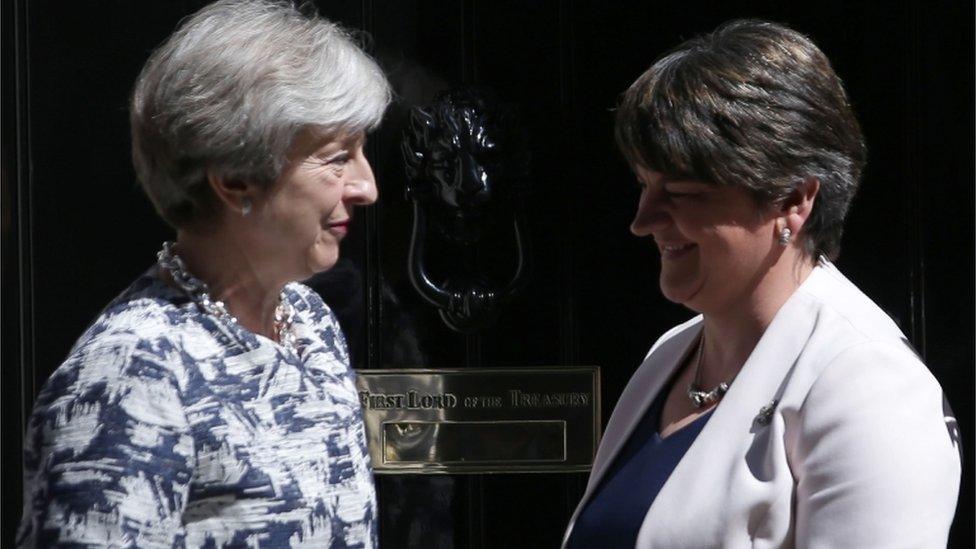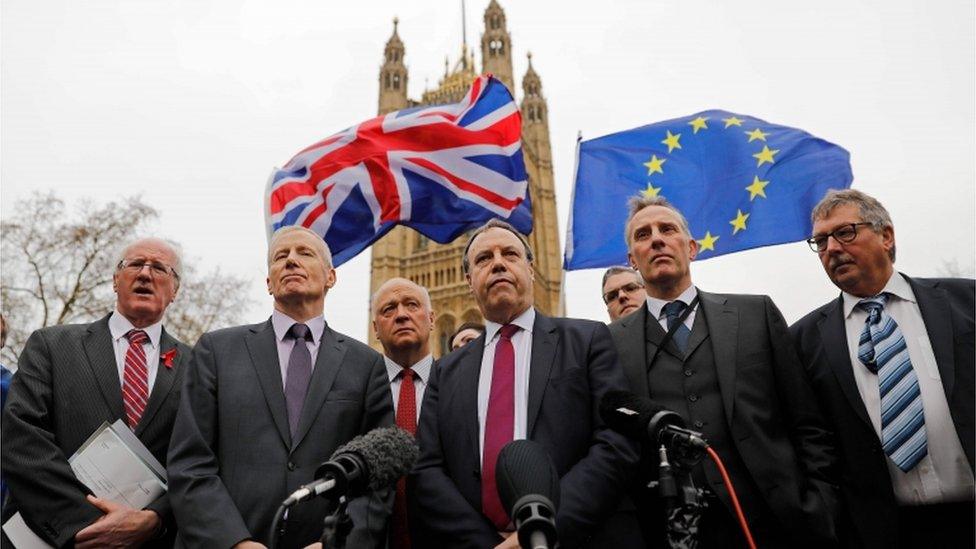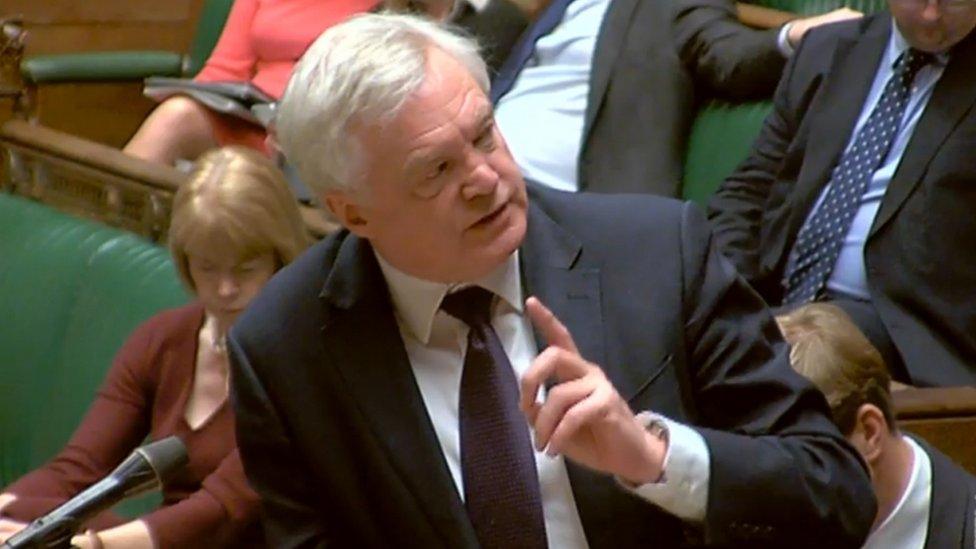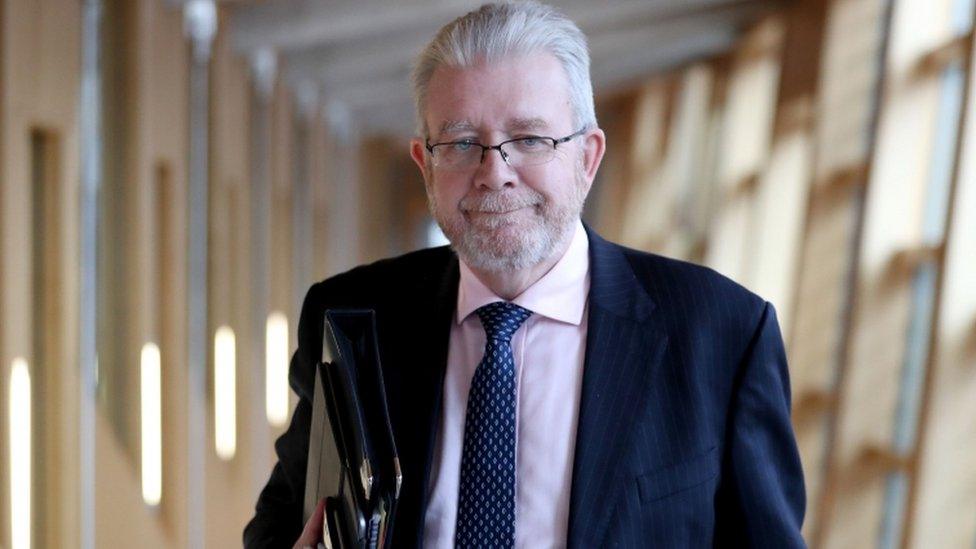Ireland and the Westminster psyche
- Published

Theresa May depends on Arlene Foster's 10 DUP MPs to prop up her minority government
There is widespread exasperation at the failure of the Brexit talks to move on to the next phase. But is there another faint emotion lurking somewhere in the shadowy background?
When politicians and commentators voice their frustration that the talks have foundered upon the question of Ireland, is there just a touch, a tiny scintilla of "how dare they?"
Remember that, as far back as 1990 (or, as recently, depending upon your view of history), the UK government declared that Britain had "no selfish strategic or economic interest" in Northern Ireland.
Is there, buried in the Westminster psyche, just a tiny touch of annoyance that the grand design of Brexit (or squalid manoeuvre, according to taste) is seemingly being held up by the Six Counties?
Does that surface, gasping slightly, in comments to the effect that the NI question has prompted problems "at the eleventh hour?" As if it were an adjunct, an irritant almost.
Do the people who make these comments not reflect that the status of Northern Ireland has been crucial throughout, that it featured significantly during the referendum? Remember that visit to NI by former Prime Ministers Major and Blair.
Is that attitude present, just a fraction, in the hints dropped to the effect that what is being sought is a form of words, with little substance, which placate NI for a while, permitting phase two to begin?
Whitehall psyche
And, pushing it a little but bear with me, does that subterranean attitude extend, ever so slightly, to the Republic of Ireland too?
Is there something, also buried in the Westminster and Whitehall psyche, which regards the arguments advanced by the Republic as tangential, as divergent from the core substance? As Gibraltar, with better tunes.
To emphasise, I am not over-egging this. I am aware that serious political leaders are working hard to resolve this impasse; that they are acutely attuned to the dilemma.
But political action does not operate in a vacuum. It subsists in an environment of thought and prevailing attitude.
This one has been coming. In August, the UK government outlined thinking with regard to Northern Ireland, post Brexit.
The talk then was of "an invisible border" which would permit trade and movement across the island of Ireland, as at present.

The DUP does not want Northern Ireland to be treated differently from the rest of the UK in Brexit talks
Snag was the absence of detail - and of political buy-in upon that island itself. Second snag was that the EU spotted this potential problem, lampooning the document as "magical thinking". And not in the sense of Panto magic. Rather in the sense of fantasy.
It has become almost de rigeur in British political circles to satirise the Ulster Unionists. That is, with the exception of the prime minister who needs their votes to stay in Westminster power.
But try looking at things another way. The DUP said no to the emerging deal, prompting a dispute at to what they were told and when.
See it from their standpoint. They believe in Northern Ireland as an intrinsic part of the UK. They believe in defending that position. It is therefore consistent for them to speak out against an initiative which they regard as potentially damaging that status.
Differentiated status
Equally, of course, it can be pointed out that there is already a differentiated status for Northern Ireland, in governance (currently stalled) and in funding, the price for the deal with Theresa May.
In the south of the island of Ireland, the Taoiseach Leo Varadkar presses for a guarantee that a hard border with the north will not emerge "under any circumstances."
He is, in short, speaking out strongly - and, to be clear, unequivocally - for the interests of his people as he sees them, noting en passant that he is no way seeking to alter the existing constitutional status of the north.
For a deal to emerge now, it will require all participants to treat these issues as they are, not as others might wish them to be. To recognise the legitimate demands and concerns on the island of Ireland, north and south. Not as subsidiary to Brexit and UK interests, but in their own right.

David David took questions on Brexit in the House of Commons
Some commentators have suggested that it might have been helpful if the prime minister had taken greater care to bring her DUP partners with her at all points. That she might usefully have been more precise about what was - and, crucially, was not on offer.
In answering questions in the Commons, there was a world-weary cynicism about David Davis, the Brexit Secretary.
Asked about progress, he said the UK was "in the middle an ongoing round" of talks. Cue laughter. He noted, drily, that these talks had yet to reach their final conclusion. The House again erupted in satirical laughter.
Again wearily, Mr Davis said he intended to be circumspect. But, perhaps reflecting the exasperation noted above, he delivered one line clearly and, borrowing his tone from the island of Ireland, with firmness.
There were no circumstances, he said, in which the UKG would be leaving Northern Ireland behind in the single market or customs union. Given that, he advised Nicola Sturgeon to desist from "banging the tattered drum of independence."

Mike Russell has called for Scotland's political parties to unite in calling for a UK-wide solution to Brexit
At Holyrood, meanwhile, Mike Russell, Scotland's Minister for Mitigating Brexit, was comparably clear and firm. At the same time, he took steps, on more than one occasion, to steer clear of unnecessary partisan conflict.
With deft mock weariness - D. Davis displayed the real thing - Mr Russell suggested that the PM might well learn a lesson from the consequences of a "chronic failure to keep everyone informed."
Further, he suggested a solution. Instead of a distinctive deal for NI, the benefits of free trade and movement should be extended across the whole UK.
The whole UK, note. Not just Scotland. He was not, at this point, suggesting Scottish differentiation. This was, of course, presaged in the SG white paper a year ago which suggested that, in the absence of UK membership or Scottish membership of the EU, then UK membership of the single market should be sought first.
Mr Russell even offered a couple of linguistic descriptions for such a set-up. It might be "dynamic regulatory compliance" between Ireland and the UK - or the retention of the acquis communautaire.
For the Tories, Jackson Carlaw pointed out the hazards of Scottish differentiation as he saw them: limits on access to English markets. But, particularly given the stance of the Minister, Mr Carlaw's rhetoric was restrained. His heart wasn't in it, on this occasion.
Rather, he suggested again that it should be possible to agree common compliance in key areas across the UK as a whole.
For Labour, Lewis Macdonald argued for a UK deal. While Willie Rennie of the Liberal Democrats said that the "guddle" required a further referendum.